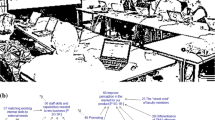Abstract
This study investigates two roles in Group Support Systems (GSS) meetings, those of the facilitator and the technical support person or “chauffeur.” GSS technology originated as a support for cooperative work in groups. The work of facilitators, who have traditionally supported group work both in terms of structure and process is changing. GSS involve a “mechanistic” approach, and, typically, in such GSS systems as MeetingWorks, a technical operator or chauffeur within the software environment will take over some of the facilitator functions. The facilitator can accommodate this in various ways. One approach is to develop a role relationship with the chauffeur, if possible, given the two seemingly distinct areas of expertise. This study attempts to address what form this relationship might take and how it might develop. We use an interpretivist framework and grounded theory methodology, together with focused interviews to investigate these questions from two selected case studies of a facilitator and chauffeur team who conducted GSS meetings with nine client groups. The study outcomes were the development of a descriptive model (EDASA) of the relationship development process between the team members and a description of alternative role relationships for facilitator and chauffeur.
Similar content being viewed by others
References
ArgyrisC., and D.A.Schön. (1974).Theory in Practice: Increasing Professional Effectiveness. San Francisco: Jossey-Bass.
Atkinson, D. (1993). “A Study of Perceptions of Individual Participants of a Client Group Undertaking a Series of Meetings Supported by a Group Support System (GSS).” Doctoral Candidacy Proposal, Curtin University, Perth, WA.
BolmanL.G., and T.E.Deal. (1991).Reframing Organizations: Artistry, Choice and Leadership. San Francisco: Jossey-Bass.
ClawsonV.K., R.P.Bostrom, and R.Anson. (1993). “The Role of the Facilitator in Computer-Supported Meetings,”Small Group Research 24(4), 547–565.
DelbecqA.L., and A.H.Van deVen. (1971). “A Group Process Model for Problem Identification and Program Planning,”Journal of Applied Behavioral Science 7, 466–492.
DennisA.R., J.F.George, L.M.Jessup, J.F.Nunamaker, and D.R.Vogel. (1988). “Information Technology to Support Electronic Meetings,”MIS Quarterly 12(4), 591–624.
FlanaganJ. (1954). “The Critical Incident Technique,”Psychological Bulletin 51, 327–358.
FolgerJ.P., and M.S.Poole. (1984).Working Through Conflict. Glenview IL: Scott Foresman.
Garcia, J.E., L.F. Lewis, and K.S. Keleman. (1989). “An Adaptive Design Model for Recurring GDSS Applications: An Extended Field Study.” Paper presented at the ORSA/TIMS Joint National Meeting, New York, NY, April.
GlaserB., and A.S.Strauss. (1967).The Discovery of Grounded Theory Strategies for Qualitative Research. Chicago, IL: Aldine.
GoetzJ.P., and M.D.LeCompte. (1981). “Ethnographic Research and the Problem of Data Reduction,”Anthropology and Education Quarterly 12, 51–70.
HeronJ. (1989).The Facilitator's Handbook. London: Kogan Page.
KelemanK.S., L.F.Lewis, and J.E.Garcia. (1993). “Script Management: A Link between Group Support Systems and Organizational Learning,Small Group Research 24(4), 566–582.
KerlingerF.N. (1986).Foundations of Behavioral Research. New York, NY: Holt, Rinehart and Winston.
LewisL.F., and K.S.Keleman. (1991).MeetingWorks User's Manual. Bellingham, WA: Meeting Works Associates.
LewisL.F., and A.M.Whiteley. (1992). “Initial Perceptions of Facilitators Using GDSS: A Study Using the Grounded-Theory Approach.” In J.Nunamaker (ed.),Proceedings of the Twenty-Fifth Annual Hawaii International Conference on System Sciences. Los Alamitos, CA: IEEE Computer Society Press.
PhillipsL.D. (1989). “People-Centered Group Decision Support.” In G.I.Doukidis, F.Land, and G.Miller (eds.),Knowledge-Based Management Support Systems. Chichester, UK: Ellis Horwood.
PooleM.S., D.L.Shannon, and G.R.DeSanctis. (1992). “Communication Media and Negotiation Processes.” In L.L.Putnam and Roloff (eds.),Communication and Negotiation. Newbury Park, CA: Sage.
PooleM.S., and G.R.DeSanctis. (1990). “Understanding the Use of Group Decision Support Systems: The Theory of Adaptive Structuration.” In C.Steinfield and J.Fulk (eds.),Organizations and Communication Technology. Beverly Hills, CA: Sage.
QuinnR.E., J.Rohrbaugh, and M.R.McGrath. (1985). “Automated Decision Conferencing: How It Works,”Personnel 62, 49–55.
SeidelJ.V., R.Kjolseth, and E.Seymour. (1988).The Ethnograph: A User's Guide. Corvallis, OR: Qualis Associates.
StraussA.L., and J.M.Corbin. (1990).Basics of Qualitative Research Grounded Theory Procedures and Techniques. Beverly Hills, CA: Sage.
TurnerD.N. (1990). “Intra-Organizational Bargaining: The Effect of Goal Congruence and Trust on Negotiator Strategy Use,”Communication Studies 41, 54–75.
WagnerG.R., WynneB.E., and B.E.Mennecke. (1993). “Group Support Systems Facilities and Software.” In L.M.Jessup and J.S.Jessup (eds.),Group Support Systems New Perspectives, New York: Macmillan.
Wagner, G.R. (1981). “Decision Support Systems Computerized Mind Support for Executive Problems,”Managerial Planning, (September/October) 9–16.
Whiteley, A.M. (1992). “Expanding the Horizons of HRM Teaching: Organizational Culture and the Core Values Model.” In A. M. Whiteley (ed.),Proceedings of the Second International Organizational Behavior Teaching Conference. Perth, Western Australia.
Author information
Authors and Affiliations
Rights and permissions
About this article
Cite this article
Whiteley, A.M., Garcia, J.E. The facilitator and the chauffeur in GSS: Explorations in the forging of a relationship. Group Decis Negot 5, 31–50 (1996). https://doi.org/10.1007/BF02404175
Issue Date:
DOI: https://doi.org/10.1007/BF02404175




